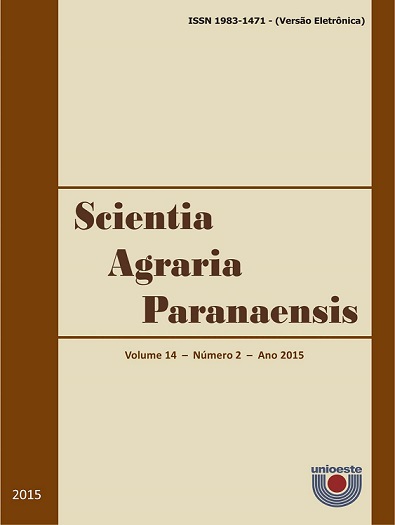Alelopatia de espécies forrageiras sobre a germinação e atividade de peroxidase em alface
DOI:
https://doi.org/10.18188/sap.v14i2.8385Palavras-chave:
Alelopatia, Aveia, Azevém, Braquiária, Feijão GuanduResumo
O efeito inibitório ou benéfico, direto ou indireto, de uma planta sobre outra é conhecido como alelopatia. Com o objetivo de identificar possíveis efeitos alelopáticos, foi conduzido em laboratório um bioensaio com delineamento inteiramente casualizado, para avaliar o efeito de extratos aquosos, obtidos por infusão das folhas secas de aveia (Avena sativa cv. IPR 126), feijão guandu (Cajanus cajan cv. Mandarin), azevém (Lolium multiflorum) e braquiária (Brachiaria brizantha cv. Marandú) sobre a germinação, o conteúdo de proteína celular e atividade da enzima peroxidase de alface (Lactuca sativa). Os extratos de feijão guandu e aveia reduziram a germinação de alface, sendo que a aveia apresentou maior efeito alelopático, retardando e diminuindo a emergência das plântulas de alface. Para esses tratamentos se observou menor atividade da peroxidase. Os extratos de azevém e braquiária não exercem efeito alelopático sobre a germinação e atividade enzimática de plântulas de alface.
Downloads
Publicado
Como Citar
Edição
Seção
Licença
Aviso de Direito Autoral Creative Commons
Política para Periódicos de Acesso Livre
Autores que publicam nesta revista concordam com os seguintes termos:
1. Autores mantém os direitos autorais e concedem à revista o direito de primeira publicação, com o trabalho simultaneamente licenciado sob a Licença Creative Commons Attribution que permite o compartilhamento do trabalho com reconhecimento da autoria e publicação inicial nesta revista.2. Autores têm autorização para assumir contratos adicionais separadamente, para distribuição não-exclusiva da versão do trabalho publicada nesta revista (ex.: publicar em repositório institucional ou como capítulo de livro), com reconhecimento de autoria e publicação inicial nesta revista.
3. Autores têm permissão e são estimulados a publicar e distribuir seu trabalho online (ex.: em repositórios institucionais ou na sua página pessoal) a qualquer ponto antes ou durante o processo editorial, já que isso pode gerar alterações produtivas, bem como aumentar o impacto e a citação do trabalho publicado (Veja O Efeito do Acesso Livre).
Licença Creative Commons
Esta obra está licenciada com uma Licença Creative Commons Atribuição-NãoComercial-CompartilhaIgual 4.0 Internacional, o que permite compartilhar, copiar, distribuir, exibir, reproduzir, a totalidade ou partes desde que não tenha objetivo comercial e sejam citados os autores e a fonte.


